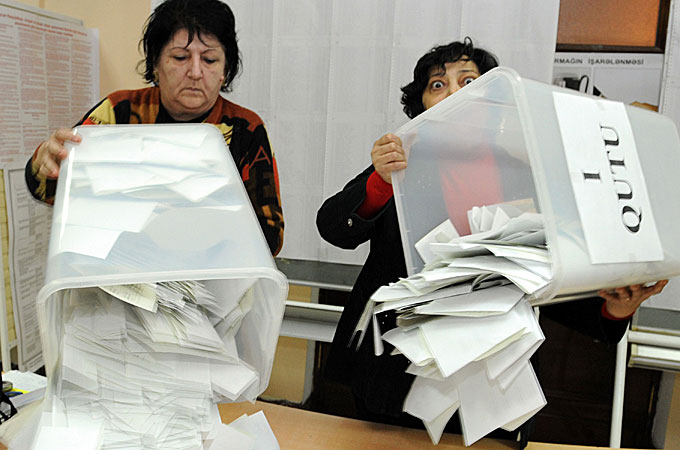Monitors criticise Azeri elections
Western observers and opposition groups condemn weekend vote as unfair as president tightens control of oil-rich nation.

 |
| Parliamentary elections on Sunday were condemned by the opposition as a charade [AFP] |
Western monitors have criticised Azerbaijan for failing to make any “meaningful” democratic progress after elections that saw the ruling party of Ilham Aliyev, the president, win a strong majority.
The conduct of the elections “was not sufficient to constitute meaningful progress in the democratic development of the country,” monitors from the Organisation for Security and Co-operation in Europe (OSCE), the Council of Europe and European Parliament said on Monday.
The OSCE said the election had been marred by “limitations of media freedom and freedom of assembly,” and an “uneven playing field” after many opposition candidates failed to be registered and some cases of ballot stuffing occured.
Audrey Glover, the head of the OSCE monitoring team, also condemned “restrictions of fundamental freedoms, media bias, the dominance of public life by one party, and serious violations on election day”.
Criticism rejected
Sunday’s elections saw Aliyev tighten his hold over the former Soviet state, with his New Azerbaijan Party gaining at least seven seats in parliament, bringing its total to 71 out of the 125-seat assembly.
The remainder were largely won by independents loyal to the government.
Aliyev’s party has rejected accusations of fraud, saying that the elections “conformed to European standards”.
“There are of course some criticisms, with which we do not agree,” party deputy executive secretary Mubariz Gurbanly told the AFP news agency.
The leading opposition party, Musavat, failed to win a single seat and criticised the vote as “illegitimate”.
“Yesterday’s events had nothing to do with elections, it was the most shameful kind of election,” Musavat leader Isa Gambar told a press conference.
However, the European Union is likely to tread carefully on the topic because Azerbaijan, an oil and gas exporter, is key to Europe’s hopes of reducing its energy dependence on Russia.
The US, which uses Azerbaijan for a transit route for its troops and supplies to Afghanistan, is also in a similar position.
The mainly Muslim country of nine million people is located at a strategic crossroads, bordering Iran, Turkey and Russia at the threshold of Central Asia.
It hosts oil majors including BP, ExxonMobil and Chevron.
Azerbaijan’s opposition has accused Western countries of tempering criticism of human rights abuses in order to protect their strategic interests in the country.